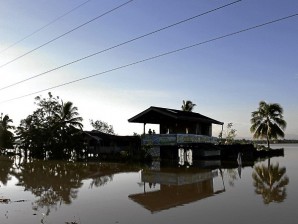New Bataan: From wall of mountains to valley of death

A HOUSE appears to have survived the onslaught of Typhoon “Pablo” in New Bataan, Compostela Valley, where scores had been killed by the strongest storm to hit the Philippines this year. JEOFFREY MAITEM
NEW BATAAN, Compostela Valley—The secluded valley that sheltered Jerry Blanco’s banana crop from communist and Moro rebellions offered no refuge from Typhoon “Pablo,” which left him destitute in a flash.
“First the strong winds came, then a sheet of rain. Our roof rattled, the house creaked and then the wall was blown away,” said Blanco, a 39-year-old plantation worker, recalling the predawn hour when Pablo struck.
“I looked out across the field, and all the (banana stalks) were felled. Our harvest was gone. The first thought in my mind was, we’ve just lost our future,” the father of four told Agence France-Presse (AFP).
Barefoot, shirtless and wearing torn trousers, Blanco stood by the roadside with neighbors who had also suddenly lost everything.
For Ben Alpor, also a plantation worker, the disaster meant the three youngest of his seven children would have to stop going to school.
Article continues after this advertisement“I will not be able to afford it. What little savings we had was in a (children’s) piggy bank, and that has been blown away too,” the 55-year-old told AFP. “We’ve been reduced to begging for food, when before we had so much to eat,” Alpor added.
Article continues after this advertisement200,000 farm hands
Ensconced in a valley that is the center of the country’s banana industry, New Bataan is surrounded by a wall of mountains that had long protected it from storms before Pablo barreled through.
From the 1960s, the valley was settled by migrants who found its sheltered location ideal for growing bananas, a crop that earned the nation $471 million last year in exports—about 12 percent of total Philippine farm exports.
Big corporate farms bought up large tracts, contracting locals as sharecroppers in an industry that has grown to become the world’s third-largest exporter of bananas—after Ecuador and Costa Rica.
Up to 200,000 farm hands plus their families live around the 42,000 hectares of plantations across Mindanao that supply major markets such as China, Japan and Iran, according to the industry association.
Days after Pablo (international name: “Bopha”) obliterated their town of New Bataan, they were reduced to begging for help from passing motorists.
Last week’s terrifying typhoon destroyed crops worth P11.23 billion, with bananas accounting for P7.4 billion of the total, according to the Department of Agriculture.
The National Disaster Risk Reduction and Management Council (NDRRMC) said the death toll as of Tuesday was 714. Another 840 were reported missing a week after the 16th storm of the season rampaged across Mindanao, igniting flash floods, devastating farmlands, tearing houses and buildings.
The toll could very well exceed lives lost during a sweep in the same area a year ago by Tropical Storm “Sendong”—officially placed at 1,268 dead and 181 missing.
The NDRRMC said the typhoon affected 5.4 million people in 30 provinces. It said 130,000 people were still in 134 evacuation centers.
The Department of Social Welfare and Development said some 40,000 houses were either totally or partially destroyed. Social Welfare Secretary Corazon Soliman said the department was building bunk houses through its P42-million cash-for-work program. Each worker will get P218 a day.
The banana regions had weathered the worst of deadly insurgencies by Moro and communist rebels that engulfed other areas of Mindanao over recent decades.
The New Bataan plantation workers earned up to P10,000 a month and were allowed to build wooden homes near their places of work.
“We had everything that we wanted, a simple life, enough food on the table and friends and family—until the typhoon came and destroyed everything,” Blanco said.
Up to 14,175 ha of banana crops were destroyed, a third of the country’s production, said Carlo Mallo, spokesperson of the Philippine Banana Growers and Exporters Association.
2 months to replant
The group estimates the damage to crops and infrastructure at P8 billion.
It will take two months to clean up and replant the fields and nine months after that before the next harvest, Mallo said.
Gov. Arthur Uy of Compostela Valley said up to 80 percent of the province’s banana crop had been lost, with dire consequences for the 150,000 local farmers and their families who depend on the industry.
“It would take years,” he told AFP when asked about the plantations’ recovery. “We need assistance from the national government.”
Agriculture Secretary Proceso Alcala said the production shortage would cause the Philippines to lose foreign customers for high-quality bananas to Ecuador.
“The worrying thing is that if we lose them we might not get them back,” Alcala told ABS-CBN television in Manila.
Businessman Richard Acaso, who buys bananas wholesale and sells them to local markets, said he may now be forced to sell his home and move elsewhere.
“I used to get 5,000 to 8,000 crates of bananas a week,” he said, equivalent to 75-120 tons. “You would be lucky to buy a (single) crate this time around.” AFP with reports from Nikko Dizon, Cynthia D. Balana and Riza T. Olchondra